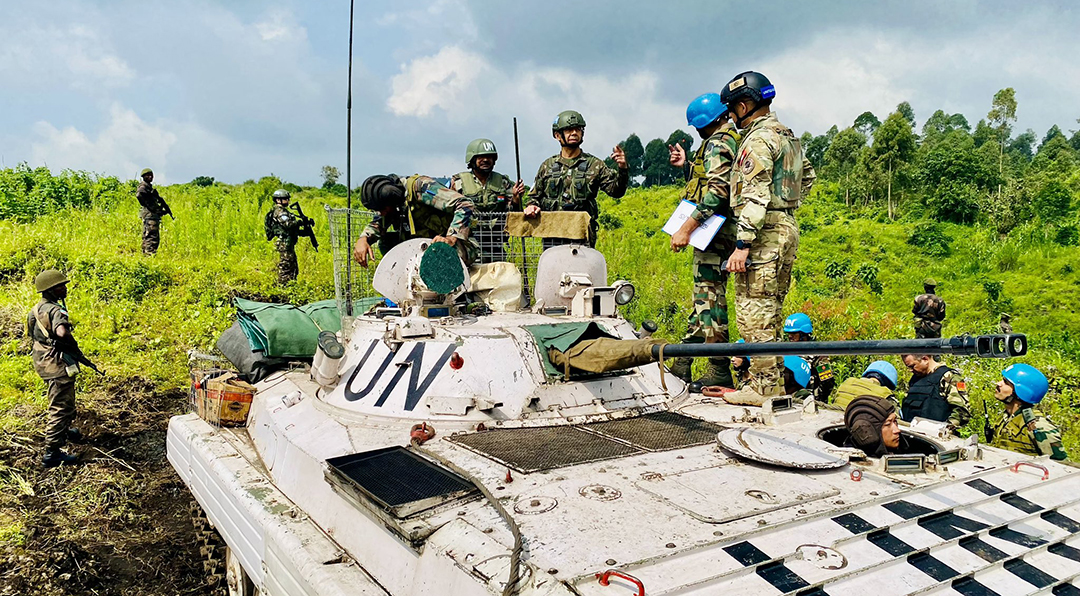MONUSCO’s Gradual Departure Poses Risk to DRC Civilians, Remaining Forces
ADF STAFF
High in the Virunga mountains in the town of Lubero, United Nations peacekeepers ceremonially lowered their flag and raised that of the Democratic Republic of the Congo (DRC). On December 26, 2023, the U.N. mission known as MONUSCO handed over control of a base it had occupied for 21 years.
One resident recalled the peacekeeping force’s arrival and its efforts to secure the surrounding roads.
“At the time, to get from Goma to Beni, the only way was by plane,” he told a U.N. representative. “No trader dared to use the road due to the presence of armed groups.”
MONUSCO peacekeepers began a gradual withdrawal from the DRC in mid-December. The reduction in forces makes it important to protect the troops that remain.
With its limited capacity to defend civilians from armed groups in eastern DRC, the Congolese military (FARDC) will try to keep the peace. Its newest partner is a regional force called SAMIDRC, composed of troops from the Southern African Development Community (SADC).
Contingents from Malawi, South Africa and Tanzania began to arrive on December 15, and SAMIDRC declared in a January 4 statement that it will work with FARDC as “a regional response to address the unstable and deteriorating security situation prevailing in eastern DRC.”
Frustrated with their lack of military engagement, the DRC government pushed for the withdrawal of MONUSCO and another regional force from the East African Community.
Thomas Mandrup, an expert in African security governance who teaches at Stellenbosch University in South Africa, said the focus will be to stabilize the North Kivu region and confront the M23 rebel group that is backed by Rwanda.
“The SADC force is expected to attempt, in cooperation with the local security forces, to neutralize the main rebel groups operating in the eastern DRC,” Mandrup told The Conversation Africa. “This is something that MONUSCO and the East African Community Regional Force have not been able to do for the last 20 years.
“The new intervention force must be sizeable and have proper air cover as well as transport and air elements. It must also have special forces capabilities and mobility in very difficult terrain. Also required are tactical and operational intelligence and enough firepower.”
SAMIDRC is stepping into something of a security vacuum, as MONUSCO reduces the strength of its numbers from its maximum of about 13,800 military and police personnel.
The first phase of the U.N. peacekeepers’ withdrawal began in December 2023 from South Kivu province and is expected to conclude by the end of April 2024.
In May 2024, MONUSCO will be present only in North Kivu and Ituri, as its overall numbers in the DRC will be reduced by about 2,350 personnel by July 1, 2024. Further withdrawal will be determined after an evaluation report on the first phase, which the U.N. Security Council expects by the end of June 2024.
“The year 2024 will be devoted to the implementation of this plan, which advocates a responsible and sustainable progressive withdrawal of MONUSCO,” mission chief Bintou Keita said in a recorded address released on December 31, 2023.
“During this implementation phase, it is imperative to maintain the momentum and spirit that allowed this disengagement plan with a view to making this withdrawal a model for the U.N. and the Congolese population.”
Already there have been concerns as MONUSCO’s departures create openings for armed groups to rush in.
After U.N. personnel left the town of Mushaki, which lies just 36 kilometers northwest of the North Kivu provincial capital, Goma, Congolese military officials and residents told The Associated Press (AP) that M23 rebels occupied military outposts and engaged FARDC in heavy fighting.
Army spokesperson Lt. Col. Njike Kaiko Guillaume said FARDC air strikes dislodged the rebels before troops were able to retake Mushaki.
“We are in the process of containing them in the hills,” he told the AP. “Strategies being put in place are designed to prevent collateral damage to our population.”


Comments are closed.